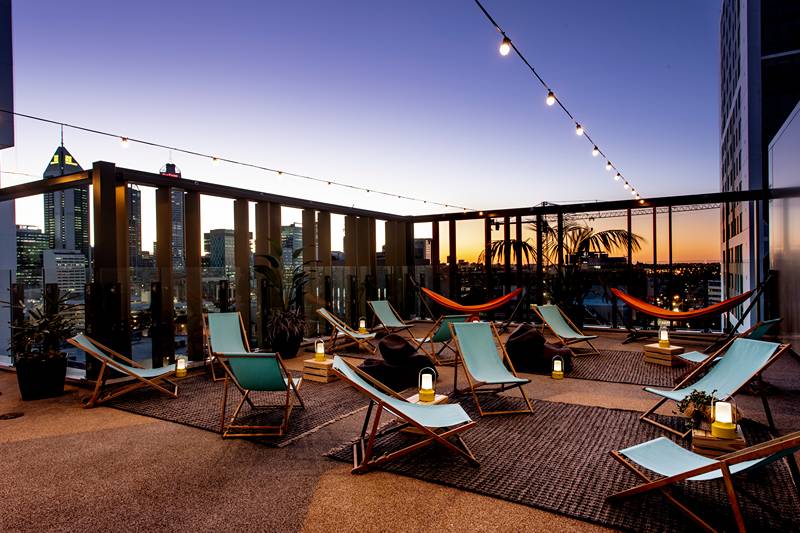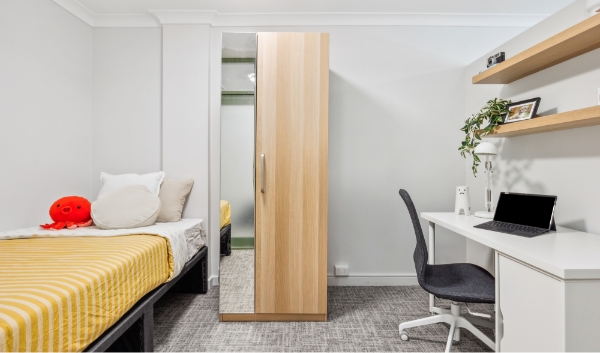
Live off campus with UWA
Flexible living, UWA connected
UWA partners with a diverse range of accommodation providers offering safe, convenient, and community-focused living options ideal for students attending the Crawley campus. Whether you’re seeking affordable rentals, premium student apartments, or housing for couples and families, there’s a UWA-endorsed solution to suit your lifestyle and budget.
- Diverse options - From budget-friendly rooms to high-quality student apartments
- Lifestyle flexibility - Great for families, couples, or independent students
- UWA-endorsed - Trusted providers connected to the wider UWA community
On this page
-
Glossary of providers
Student Accommodation - City Living: Student Accommodation - City Living offers modern, fully furnished living with student-focused amenities—ideal for convenience, community, and a vibrant, independent lifestyle near UWA, within the heart of Perth City.
Living Like a Local: Living Like a Local offers authentic off-campus experiences through trusted homestays or rental partners, perfect for students seeking independence with local connection and support.
Accommodation Availability Update
Student Accommodation: Applications for 2026 now open- Good availability
Homestays: Good availability 2025 and 2026
UWA Accommodation team
The UWA Accommodation Team is here to help you find the right place to live—because where you live matters as much as where you study.
At UWA, we offer a range of quality options to suit all lifestyles and budgets, from UWA-owned residences to trusted affiliated partners.
Student Accommodation - City Living
What's Student Accommodation- City Living
UWA has partnered up with organisations that provide dedicated student accommodation facilities within the heart of Perth City.
Student Accommodation offers independent living with the comfort of modern, fully furnished apartments and the flexibility to live your own way, while still being part of a student community – designed specifically for students!
Download the Student Accommodation Guide - Living in Perth [PDF 8MB]
Inclusions list
| Student accommodation | Utilities | Internet | Residential Life Program | Leasing terms available | Meals |
| The Switch | Included | Included | Yes | 6 to 12 months | Not included |
| Campus Perth | Included | Included | Yes | Flexible | Not included |
| Juno House | Included | Included | Yes | Flexible | Not included - has in property dining facilities |
-
Get around Perth City and to UWA
Bus Routes to UWA Crawley Campus
The bus routes from The Switch to UWA are easily accessible, with frequent services connecting the two locations.
Please visit the Transperth website here. The free Transperth app is available to download on iOS and Android devices.
Purple CAT: The Purple CAT route is a free bus service from Elizabeth Quay and UWA, with departures approximately every 10 minutes.
Elizabeth Quay is conveniently located just 1 km from The Switch, making it an easy and accessible connection point. Route 950: A direct and frequent bus service between the CBD and UWA.






.png?h=576&iar=0&w=792&hash=88658D8B52E947754CAE563025C0E1AA)
The Switch
The Switch offers all-inclusive, modern student living in Perth’s vibrant city centre—steps from transport, culture, and UWA, with flexible, inclusive, and wellness-focused amenities designed to support your best life.
-
More information
Located across the road from Yagan Square in the hub of Perth’s beautiful city centre with a world of entertainment, lifestyle, cultural events, diverse cuisine and shops right on the doorstep.
Why The Switch? Truly all-inclusive rents; with utilities, super-fast Wi-Fi access, on-site laundry facilities, fitness classes and access to the Sonder safety and wellness app included in your weekly rent. Ultra-functional /Radically Inclusive /Supporting the best you /personalised accommodation options /sustainably focused /Aspirational & Entrepreneurial.

Campus Perth
Campus Perth offers contemporary student living in downtown Perth with private rooms—some with ensuite bathrooms—and flexible leasing options, including fixed terms and short stays under 13 weeks. Enjoy shared facilities like study spaces, theatre, gym, rooftop, and more. Welcome home!
-
More information
Don’t get stuck in boring student accommodation. Instead, stay in your own sweet space complete with cool decor, the hottest technology and fresh furniture. Along with your own room, you can also choose to have your own bathroom -can we hear an Amen!? You’ll also love the shared facilities, complete with a study space, theatre, community garden, gym, rooftop, communal kitchens, yoga studio, gaming station and much more! We’ve got it all and right in the heart of downtown Perth. Welcome home.

Juno House
A boutique co-living space in the heart of Perth, designed for students, young professionals, and digital nomads.
-
More Information
Enjoy flexible medium, and long-term rental options starting from just one month—perfect for those seeking hassle-free living without long leases or hidden costs.
More than just accommodation, Juno House is a lifestyle. Residents enjoy exclusive club-style amenities at no extra cost, including a gym and yoga space, sauna, theatre room, study areas for productivity, and vibrant social lounges to connect and collaborate.
Living Like a Local: Homestays
What’s Homestay?
Starting university in a new country can be challenging, and Homestay offers a safe, supportive way to settle in. With UWA Hosted Accommodation, you’ll live with a local host—often a UWA alum or neighbour—who provides valuable insights into Perth life and a welcoming home environment.
You’ll be matched with a host based on shared interests and proximity to campus. All hosts are thoroughly vetted, including police checks, making Homestay a safer and more reliable option than budget alternatives like share housing.
Pricing depends on your age, room type (private or shared), and chosen meal package. Traditional Homestay includes dinner and breakfast daily, weekend lunches, a fully furnished room, linen, utilities, and internet—all bundled for convenience and peace of mind.
.jpg?h=300&iar=0&w=600&hash=7F3FF3208A64D782F6D724656EB7100E)
Australian homestay Network
Discover affordable co-living in Perth with insider tips from locals, facilitated by AHN's matching service for like-minded individuals. Suitable for Under 18 international students!
-
More information
The Australian Homestay Network (AHN) offers safe, affordable and comfortable accommodation for students who are looking to study in Perth, Western Australia.
Our welcoming hosts provide the feeling and support of home so you can settle in faster and become familiar with your new city and lifestyle. Choose from a range of flexible packages inclusive of meals, utilities and internet access as well as 24/7 support, local orientation and insurance.
AHN’s world-class standards include a home inspection, interview and background check for hosts and a unique matching system to connect you with a host that suits your needs.
- Pricing and inclusions
- Application process [PDF 280KB]
.png?h=718&iar=0&w=1729&hash=0777E88CE4F5678EC85DC9D37E47736C)
Talk About Homestay
-
More information
With a strong track record of placing international students into welcoming Perth homes, Talkabout Homestay takes pride in their ability to connect students with the perfect Australian household. Over the years, they have developed a close partnership with the University of Western Australia (UWA), solidifying their reputation as a trusted choice for international students.
Rental Partners
UWA has partnered up with reputable real estate agencies to explore the private rental market with you.
Did you know UWA’s partnership with local realty agencies gives our students priority access to rental applications – even before properties are listed online? Plus, agents will present your application directly to homeowners, something usually reserved for the most competitive applicants.
-
Know your tenancy rights
Navigating the rental market can be complex, so it’s important to understand your tenancy rights. UWA encourages students to familiarize themselves with resources like the REIWA Tenancy Guide, which offers valuable information on renting in Western Australia.
When renting private accommodation, unlike share housing or subletting, you have formal tenancy rights and protections under the law. Be cautious with informal arrangements such as subletting or house sharing, as these may not provide the same legal safeguards. Always ensure your rental agreement is legitimate and that you understand your rights before signing, work with UWA rental partner.

SOCO REALTY
SOCO REALTY is a boutique real estate agency focused on selling and managing residential and commercial property in Perth. Our mission statement is to support and educate our clients to assist them to make their best real estate decisions.
-
More information
Perfect for those with families or unique accommodation requirements, the Soco team are experts in the Perth rental market and can find the perfect property for you based on your individual needs.
If you’ve reached out to UWA Accommodation or joined the central Live at UWA accommodation waitlist, any priority listings not yet advertised will be shared directly by our concierge team.
.jpg?h=453&iar=0&w=680&hash=8227DDB77AF9FA72056565317A31AF0B)
Rent Choice
At Rent Choice, we understand the importance of efficient and reliable property management. With our extensive industry experience, we have solidified our reputation as a trusted partner for property owners.
-
More information
Our company is built on a foundation of knowledge and experience. Our team of property management experts possess a deep understanding of the local real estate market, industry trends, and regulatory requirements. We stay up-to-date with the latest changes in laws and regulations to ensure full compliance and protect the interests of our clients.
If you’ve reached out to UWA Accommodation or joined the central Live at UWA accommodation waitlist, any priority listings not yet advertised will be shared directly by our concierge team.

